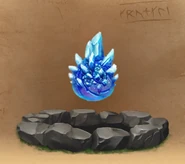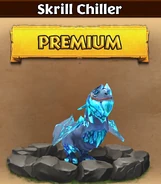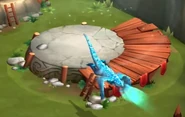Skrill Chiller
Last
Dragons: Rise of Berk
“
A very cool dragon! Like me. [src] ”
— Eret
Skrill Chiller is a Premium Snow Wraith that appears in Dragons: Rise of Berk Eret, Son of Eret .
Description
“
The Vikings have heard tales of a dragon from the far north, a Snow Wraith that rides the winter winds and will fight rampaging Skrills to the last of its chilled breath.
”
— Dragons: Rise of Berk
Appearance This dragon looks rather different from a regular Snow Wraith. It's body is glistening blue with tiny specks of white that resembles snow. It suits its habitat well and looks as if carved from a glacier. Skrill Chiller's back is lined with hard, sharp plates and a row of sharp spikes run down its tail.
Abilities The Skrill Chiller was described to be able to "ride the winter winds." If taken literally, it resembles a Skrill riding lightning. The wind may be used to boost its speed while flying similar to how Skrills boost their speed with lightning.
This dragon should be very tough and strong. It can take on Skrills, which are very powerful dragons, with its frost fusillade.
Trivia When placed on Berk, Skrill Chiller has a flurry over its platform.
Due to its hostility toward Skrills, there is a chance that Snow Wraiths and Skrills are natural enemies, like Thunderdrums and Death Songs .
The description of the Skrill Chiller appears to state that it is a wild dragon. However, it has been trained by Eret, Son of Eret.
It is unknown how Eret was able to train Skrill Chiller despite the fact that it has been stated that Snow Wraiths are impossible to train. It is possible that Snow Wraiths are just extremely hard to train, like a Skrill or a Speed Stinger . Gallery
Pulling a Skrill Chiller card
Skrill Chiller's Information
References Site Navigation
Dragon Characters of
Deathgripper :Death Knight • Defender Deathgripper • Executie • Fenrir's Eviscereaper • Glaivedriver • Grim Hornettle • Grimmel's Deathgrippers • Maelstrom • Marshland Deathgripper • Miasmic Deathgripper • Monarchic Murderfly • Sappheral • Slaughterdijk Light Fury :Light Fury Night Fury :Toothless Skrill :Alpha Skrill • Brute Skrill • Defender Skrill • Dynamojo • Frozen Skrill • Fryrir • Hide-Fryer • Hunterbolt • Icebane • Joltalon • Marshland Skrill • Revenger • Shadow Skrill • Shrill Boltbeak • Skitterbugs • Sleigher • Spark Guard • Sparkheart Snow Wraith :Coldreign • Firntom • Frostfang • Frostfright's Big Bro • Frostfright's Lil Sis • Furtive Fleetsleet • Glazier • Gothi's Frostfright • Skrill Chiller • Wild Wraith • Wood Wraith Triple Stryke :Champion Triple Stryke • Common Triple Stryke • Deathstalker • Eclipser • Emperor Pandinus • Ketillkott • Marooned Manstinger • Moonshock • Rosethorn • Slender Green Triple Stryke • Sleuther • Smouldering Slusher • Starstreak • Stone Mother • Syringaca • Thorntail • Triple Strype Woolly Howl :Defender Woolly Howl • Frostfire • Fuzzbucket • Fuzzrir • Mystic Wing • Wise Wind • Woodwind
Bubblehorn :Nibbles Fireworm :Brightburn • Defender Fireworm • Enhanced Fireworm Queen • Ghostglow • Glowmer • Fearsome Flamellion • Flashfright • Homunculosa • Plain Fireworm Queen • Royal Fireworm • Snotlout's Fireworm Queen • Solar Flare • Verdigriff Flame Whipper :Barrow Burrower • Kindlegarter • Tailflame Gobsucker :Dijester • Fetid Beauty • Gobstinker • Muddlehunt • Sparklestank • Sulfurous Snifflepharts Green Death :Crimson Death • Red Death • Violet Death Hobblegrunt :Borealis • Defender Hobblegrunt • Gruff • Primal Hobblegrunt • Staggrynte Hobgobbler :Daffodelilah • Droog • Hobs • Sludgeskulker • Smitten Hobgobbler Large Shadow Wing :Alpha Shadow • Dawnstar • Grim Gamper • Marooned Greezer • Smog-bomber • Snogglewing • Soaring Proudheart • Splashboomer Moldruffle :Exotic Moldruffle • Greenkeep • Dirt-Hurler • Jewelbilant • Rhinestorm • Snoggleswiper • Turfraider Monstrous Nightmare :Astrid's Monstrous Nightmare • Baldreng • Blazewing • Blazing Phoenixfire • Brisket, Saddle, Chuck, Rump, Loin, Scrag, Cutlet, Ham Hock, Sausages, Offal, Knuckle, and Pot Roast • Burlystorm • Cagecruncher • Cawmour • Charsoul • Defender Monstrous Nightmare • Exiled Monstrous Nightmare • Fanghook • Fangmaster • Firescrapes • Flick • Girl Hookfang • Hookblazefang • Hookfang • Hookfang's Mate • Hookfang's Nemesis • Hookfang's Offspring • Hookfire • Liberated Whip-Wreck • Merciful Nightmare • Mountain Nightmare • Munchauser • Nidhogg • Sven's Nightmare • Valka's Mercy • Whip-Slash Night Terror :Brood-blossom • Darkvarg • Dusk Mite • Hallucinerator • Hotshot • Nightwatch • Peggy • Sacred Terror • Seedling Night Terror • Smidvarg Red Death :Red Death Silver Phantom :Pearlescent Poltergeist • Starshard Singetail :Deathlout • Flamelout • Forest Singetail • Freezerburn • Grovelout • Heatlout • Hotbelly Singetail • Hotlout • Infernier • Krogan's Singetail • Scorch • Sear • Stoick • Winterwick Small Shadow Wing :Baited Breath • Brickflayer • Obskewer • Prismarch • Spring's Shadow • Shimmerwing • Sunspot Terrible Terror :Butt and Head • Defender Terrible Terror • Exiled Undersnuff • Gothi's Pet • Iggy • Kick-off Terrors • Leopold • Nibbles • Pain • Sharpshot • Smudgeon • Sneaky • Sprite • Terror of the Sea Threadtail :Almondine • Duskgust • Foliander • Mildew's Strain • Sunsoak Typhoomerang :Cinderoptera • Defender Typhoomerang • Forest Typhoomerang • Marooned Flambo • Overchill • Primal Broadguard • Pyre-Flier • Radiant Skyglow • Shroudburst • Skyfire • Tense Typhoomerang • That • Torch • Torch's Brother • Torch's Mother • Torch's Sister • Trap-phoomerang
Bewilderbeast :Berserker Bewilderbeast • Drago's Bewilderbeast • Valka's Bewilderbeast Luminous Krayfin :Lumie Mist Twister :Glimmer and Glommer • Wu and Wei Ripwrecker :Bargemine • Derelicker • Estuarian • Exotic Ripwrecker • Gloomlurker • Rogue Submaripper • Seashine • Sinker-Claws Sand Wraith :Claytrapper • Ruddy Goldenwyrm • Seedling Sand Wraith • Veiled Spectruf Scauldron :Boiling Bride • Bonecrusher's Conquest • Breampunk • Bumble • Captured Scauldron • Defender Scauldron • Exotic Scauldron • Grim Sizzle • Mea • Mildew's Misery • Scauldy • Steam-spewer • Thunderfish Seashocker :Bolt & Float • Covecharger • Defender Seashocker • Kelp Fiend • Rane & Shyne • Soaky and Wetty • Valka's Seashockers • Wavewight • Whet and Wylde Shellfire :Viggo's Shellfire Shockjaw :Boltbite • Deepfreeze • Defender Shockjaw • Exotic Shockjaw • Snappy-Zappy-Sand-Zapper • Snazzolt • Volatile Voltbolter Sliquifier :Defender Sliquifier • Exotic Sliquifier • Grazefall • Marooned Seaslick • Splashspout • Surflurker • Toxispray Submaripper :Belchfast • Deepkeeper • Mariner's Myth • Mopey-Slick • Nauticalamity • Primal Aquabeast • Shipsbane • Shipwraith Thunderdrum :Bam • Bing • Bludcrest • Boom • Champerone • Defender Thunderdrum • Earsplitter • Lil Lullaby • Reef Thunderdrum • Shifty Murklurker • Tectonic Thunderdrum • Thornado • Thunderdolt • Warcry • Waveshaker • Whirlwing • Wingburst Tide Glider :Defender Tide Glider • Exotic Tide Glider • Grim Slipsmolder • Lake Skater • Mistmenace • Shoalrake Windwalker :Galeguard • Mistroll • Seasail • Skykarver • Wayflora
Catastrophic Quaken :Aurum • Blawberry • Champion Catastrophic Quaken • Cryoconitemare • Enslaved Quakens • Four-Man • Glaciated Quaken • Ice-Tongue Quaken • Lethiferous Cromlech • Liberated Trolboulder • Melonquarry • Meltwater Kryal • PlumProng • Tormentor • Spikeback Crimson Goregutter :Bulwark • Grainfield Goregutter • Gruff Goregutter • Magnanimous Martyrium • Wapititan Eruptodon :Burjoiner • Coaldron • Defender Eruptodon • Great Protector • Kilnkin • Magmadon • Magmic Eruptodon • New Protector • Strokkur • Tectonic Thorium • Volcanic Eruptodon • Volcanic Vethorm Fault Ripper :Fissure Fault Ripper Grapple Grounder :Defender Grapple Grounder • Exotic Grapple Grounder • Fierce Piercer • Floeshot • Foul Howler • Lurchador • Sour Grapple Groncicle :Defender Groncicle • Lovesome Crackle • Primal Bewilderbreath • Rubeus • Sweetcicle • Wyrmafrost Gronckle :Book Wyrm • Cheesemonger • Crubble • Defender Gronckle • Diamondgnaw • Exiled Gronckle • Fishmeat • Gary • Gothi's Gronckle • Grove Gronckle • Grumple • Junior Tuffnut • Junior Tuffnut Junior • Meatlug • Meatlug's Mate • Meatlug's Offspring • Molten Magmannette • Obsurdian • Rockwit • Rubblegrubber • Shattermaster • Slug • Snowflakey • Thaw Fleet • Tuffnut Junior • Yawnckle Hotburple :Basket Case • Beachcomber • Bedrock Terror • Blistering Belcher • Bush-Wacker • Chartooth • Defender Hotburple • Emberock • Floe Hotburple • Grump • Hearty Hotburple • Ill Hotburple • Varmtrykke Screaming Death :Screaming Death Sentinel :Bizarregoyle • Brute Timbertoast • Cinder • Defender Sentinel • Dreadel • Elder Sentinel • Glitzy Guardian • Halcyard • Mossguard • Silent Knight Shovelhelm :Clawlifter • Damsail • Exotic Shovelhelm • Fiend Trowel • Gnawhelm • Guslout • Sky Piercer • Twigdigger Snafflefang :Brute-Wurst • Carnastial • Defender Snafflefang • Eggfang • Fendmender • Frosty Sparguard • Irontooth • Lump • Primal Snafflefang • Slough Snafflefang • Stocky Snafflefang • Soulshine • Yakstacker Thunderpede :Boulderbrute • Colorcrunch • Defender Thunderpede • Exotic Thunderpede • Furnace • Goliam • Sleet-Beater • Stonewall Whispering Death :Bombwelter • Brisk Whisper • Death Ride • Defender Whispering Death • Exotic Whispering Death • Gravedigger • Gritty Sawmaw • Groundsplitter • Guarded Whisper • Mawdrill • Screaming Death's Siblings • Sky-Pirate • Toothless' Nemesis • Trailtwister • Viperswish • Wrylite
Devilish Dervish :Speed Demon Egg Biter :Chompers • Coppertop • Egg Blossom • Exotic Egg Biter • Festivuevo • Nipper Grim Gnasher :Dawnbite • Doom Bloomer • Emberquencher • Gnasteeze • Toadlich Hackatoo :Burnwind • Cloudcarver • Defender Hackatoo • Exotic Hackatoo • Hackagift Raincutter :Defender Raincutter • Dewdrop • Droplot • Icecutter • Puddlemuck • Squall-caller • Thump Razorwhip :Crimson Slash • Crisp Grasper • Exotic Razorwhip • Fighter Razorwhip • Hailfate • Jade-Blade • Lashbane • Plated Razorwhip • Quarry Razorwhip • Sawtooth • Searing Seethsizzle • Slash-Dasher • Windshear • Wingnut Scuttleclaw :Budbite • Defender Scuttleclaw • Gressjester • Meatlug's Cheerleader • Muckruck • Scuttleclaw Hatchlings • Slushclaws Shivertooth :Distemplar • Exotic Shivertooth • Flutterfang • Scramblescout • Sweet-Tooth Speed Stinger :Corroderunner • Exotic Speed Stinger • Icebreaker • Jerry • Lead Stinger • Liberated Floutscout • Lightstrike • Seedling Speed Stinger • Speedy • Sweet-Sting • Timberprickle Stormcutter :Brute Stormcutter • Cloudjumper • Defender Stormcutter • Dimflight • Exiled Stormcutter • Glitter Bomber • Gloomleer • Hurribane • Liberated Duskcutter • Marinecutter • Reignstorm • Serene Stormcutter • Tempestuous Scalestrom • Tripfire • Wingwary • Wonderclap • Woodland Stormcutter Thornridge :Auroma • Gloomshadow • Primal Thornridge • Sparknettle • Thornshade • Warywing Timberjack :Axewing • Axewing the Second • Blossoming Bumbershoot • Brute Timberjack • Defender Timberjack • Driftcleaver • Freeweald • Jack • Lithe Loggerjammer • Lonewood • Seedling Saplinger • Soaring Sidekick • Stokehead • Stoneslice • Taxi • Tricky Timberjack • Wetland Timberjack Windstriker :Boiling Billows • Chinooker • Defender Windstriker • Galesplitter • Grim Whirlwaft • Retired Windstriker • Snaggletooth • Winged Warden
Armorwing :Bandit • Battlewhip • Coldsnap • Fool's-Gold • Goldrush • Gresskarmor • Irongaze • Knocks • Liberated Haulmauler • Twist-Trapper Boneknapper :Antiquarian Accumulator • Bludgeon Knapper • Bog-Blight • Boneshedder • Brute Boneknapper • Cryptic Collector • Defender Boneknapper • Ghaslit • Gobber's Nemesis • Grave Knapper • Purlossein • Skullcrown • Skulliton • Tomb Thief Buffalord :Auroch King • Beezelord • Big Buff • Big Snuff • Bisonarch • Boarcharger • Brute Buffalord • Exotic Buffalord • Frostgnaw • Gloom Guffawlord • Hearty Buffalord • Maeve's Heart • Mosster • Mudgut • Pufferfinch • Thicket Buffalord Cavern Crasher :Crunch Muncher • Exotic Cavern Crasher • Firecomb Crasher • Grotto Gutter • Schmoozer • Slimeball • Slimeslinger Changewing :Captured Changewing • Chimerical Chamomeleon • Defender Changewing • Edgewing • Frosticide • Hidera • Incognito • Melting Wing • Morphaileron • Phantom • Snuffnut • Springwing • Stalker Changewing • Tuaterror • Tuffwing • Underwood Changewing Deadly Spinner :Webmaster Death Song :Dropplesounder • Exotic Death Song • Garffiljorg • Garff's Adoptive Father • Hare Raiser • Jestbelter • Sirenade Dramillion :Blushing Bloomtender • Bonnefire • Dramillionaire • Elder Dramillion • Fishlegs' Dramillion • Hurleqast • Marooned Mimiric • Myrkva the Immoral • Nattvig • Standard Dramillion • Titan Wing Dramillion Featherhide :Feathers • Verdurous Ghost • Zombie Featherhide Flightmare :Defender Flightmare • Exotic Flightmare • Flaredawn • Hofferson's Bane • Skystreaker • Trancemare • Viggo's Flightmare Foreverwing :Guardian of the Forest Hideous Zippleback :Barf and Belch • Defender Hideous Zippleback • Barf and Belch's Mate • Barf and Belch's Offspring • Exiled Hideous Zippleback • Fart & Sniff • Gobble & Grinder • Hamfeist • Heel & Brak • Kandy & Kane • Muck and Tumble • Silverslash • Snort and Sniff • Snothead • Sparkle & Sparks • Sparks and Spew • Tricky Two-Heads • Valley Zippleback • Whip and Lash • Zesty Zippleback Hobgobbler :Daffodelilah • Droog • Hobs • Sludgeskulker • Smitten Hobgobbler Prickleboggle :Krustler • Polkaspots • Seedling Prickleboggle • Skypiercer • Thornforce Sandbuster :Duneworm • Frostbiter • Marooned Mukchucker • Quicksand • Sawduster • Siltsmacker • Snowball • Wild Sandbuster Silkspanner :Bayana's Silkspanners • Deft Dazzler • Marooned Deathstrand • Snarachnid Slithersong :Bloomsang • Dazzlesing • Necronomodon Slitherwing :Defender Slitherwing • Harmhug • Slinkling • Sweet-Stripe • Toksin Smothering Smokebreath :Apneatic Archechoke • Defender Smothering Smokebreath • Dustbrawler • Exotic Smothering Smokebreath • Flutter-Fog • Gritpicker • Metal Meddler • Rattling Smokebreath • Smogger Snaptrapper :Brute Snaptrapper • Cracklejacks • Death & Chocolates • Defender Snaptrapper • Grand Maw • Outsnapper • Snappy Sweet Death :Defender Sweet Death • Exotic Sweet Death • Masked Sweet Death • Seedling Sweet Death • Sqyrm • Sweet Heart Sword Stealer :Broken Blade • Chillblade • Defender Sword Stealer • Exotic Sword Stealer • Forgefeist • Gleamer • Hoary Hoarder • Scimiterror • Verdigard
Deadly Nadder :Ambered Nadder • Baby Nadder • Bork Week Nadders • Brush Nadder • Defender Deadly Nadder • Edge Nadder • Fireshrike • Flystorm • Hardychomper • Kingstail • Lethal Lancebeak • Nimble Nadder • Pincher • Scardian • Seedling Stormpest • Skyblade • Springshedder • Steelspike • Steeltrap • Stormfly • Stormfly's Mate • Stormfly's Offspring • Sunflower • Vaynglory • Vexclaw Gembreaker :Alpha Gembreaker • Crystal Crusher • Plowhorn • Shard Picker Mudraker :Glazed Swoop • Mire Mucksmear • Muddie Rumblehorn :Arctic Rumblehorn • Defender Rumblehorn • Drago's Rumblehorn • Flank-Tanker • Grimtorn • Grunt Hunter • Krogan's Rumblehorn • Poise the Vast • Rhineblow • Robust Rumblehorn • Seedling Rumblehorn • Skullcrusher • Snowcap • Son of Skullcrusher • Valiant Scarbearer Snifflehunch :Emerald Slasher • Pestbud • Primal Snifflehunch • Runter • Scentinel • Seedling Snifflehunch • Snifflestone • Winkling Submaripper :Belchfast • Deepkeeper • Mariner's Myth • Mopey-Slick • Nauticalamity • Primal Aquabeast • Shipsbane • Shipwraith Thunderclaw :Aurvandil • Bonesnarl • Defender Thunderclaw • Gyllentalon • Liberated Hardcast • Polar Thunderclaw • Rumpus • Sailback • Sturmundrang • Tundra Thunderclaw • Valiant Vingthor • Venerable Lector Windgnasher :Arcane Kulingbiter • Auroara • Bloodtooth Blain • Champion Windgnasher • Chinuke • Defender Windgnasher • Galegrinder • Gnarley • Gustnudger • Ironhide • Squashferatu • Stargust • Vindjakker • Woodland Windgnasher
Skrill Chiller is also available in other languages. Deutsch • Русский • Polski • Italiano • Français












